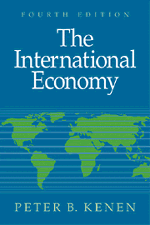Book contents
- Frontmatter
- Contents
- Preface
- PART ONE INTRODUCTION
- PART TWO INTERNATIONAL TRADE THEORY AND POLICY
- 2 Comparative Advantage and the Gains from Trade
- 3 Economic Efficiency and Comparative Advantage
- 4 Factor Endowments and Comparative Advantage
- 5 Factor Substitutiton and a Modified Ricardian Model
- 6 Factor Substitution and the Heckscher–Ohlin Model
- 7 Imperfect Competition and International Trade
- 8 Trade and Factor Movements
- 9 Instruments and Uses of Trade Policy
- 10 The Evolution of Trade Policy
- 11 The Future of the Trading System
- PART THREE INTERNATIONAL MONETARY THEORY AND POLICY
- Appendix A Mathematical Notes on Trade Theory and Policy
- Appendix B Mathematical Notes on Monetary Theory and Policy
- Appendix C Outlines of Answers to Selected Problems
- List of Abbreviations
- Index
7 - Imperfect Competition and International Trade
Published online by Cambridge University Press: 05 June 2012
- Frontmatter
- Contents
- Preface
- PART ONE INTRODUCTION
- PART TWO INTERNATIONAL TRADE THEORY AND POLICY
- 2 Comparative Advantage and the Gains from Trade
- 3 Economic Efficiency and Comparative Advantage
- 4 Factor Endowments and Comparative Advantage
- 5 Factor Substitutiton and a Modified Ricardian Model
- 6 Factor Substitution and the Heckscher–Ohlin Model
- 7 Imperfect Competition and International Trade
- 8 Trade and Factor Movements
- 9 Instruments and Uses of Trade Policy
- 10 The Evolution of Trade Policy
- 11 The Future of the Trading System
- PART THREE INTERNATIONAL MONETARY THEORY AND POLICY
- Appendix A Mathematical Notes on Trade Theory and Policy
- Appendix B Mathematical Notes on Monetary Theory and Policy
- Appendix C Outlines of Answers to Selected Problems
- List of Abbreviations
- Index
Summary
THE ISSUES
The trade models in previous chapters cannot explain two striking features of the international economy. First, countries with similar factor endowments trade heavily among themselves, resulting in two-way trade between many pairs of countries in many classes of goods. Second, firms engaged in international trade also undertake international investment, resulting in multinational production.
These two features of the international economy reflect two characteristics of modern industrial economies—imperfect competition and economies of scale. This chapter will show how those characteristics influence trade by focusing sharply on two issues:
How firms with monopoly power at home compete with similar firms abroad.
Why countries with similar factor endowments engage in two-way trade.
The next chapter will show why imperfect competition and economies of scale lead firms to undertake multinational production.
INTERINDUSTRY AND INTRAINDUSTRY TRADE
We need not dwell at length on the frequency and size of visible departures from perfect competition. Large parts of the manufacturing sector in every major country are dominated by small numbers of companies. You can count on your fingers the number of automobile manufacturers in the United States, Japan, or Western Europe, and you will have fingers left over to count the worldwide total of companies that manufacture large commercial aircraft.
Nevertheless, these numbers overstate the degree of concentration and thus understate the intensity of competition. Firms producing in one country must compete with foreign firms, not just among themselves.
- Type
- Chapter
- Information
- The International Economy , pp. 126 - 147Publisher: Cambridge University PressPrint publication year: 2000



